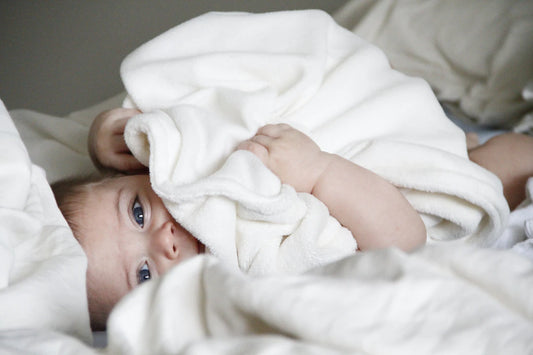Frequently Asked Questions
1. What are eco-friendly baby care products?
2. Why does eco-friendly baby care matter?
3. What are some long-term benefits of switching to eco-friendly baby care?
4. How can parents start the transition to eco-friendly baby care?
5. What should I consider when choosing eco-friendly baby care products?
In recent years, more parents have become aware of their environmental impact and are seeking ways to make a difference, even in their baby care choices. As the world becomes increasingly focused on sustainability, the movement towards eco-friendly baby care products is growing stronger. This blog explores the long-term environmental benefits of switching to eco-friendly options for caring for your little ones and why it matters now more than ever.
Why Eco-Friendly Baby Care Matters
The environment is facing unprecedented challenges, from pollution to deforestation to climate change. As parents, we carry the responsibility of protecting our planet for future generations, and making informed choices in baby care is one significant way to contribute. Eco-friendly baby care means choosing products that are not only safe for babies but also beneficial for the environment.
The Impact of Traditional Baby Products
Traditional baby care products often contain harmful chemicals and non-biodegradable materials. Disposable diapers, conventional wipes, and synthetic clothing contribute to landfills and pollution. By choosing eco-friendly alternatives, parents can minimize their overall carbon footprint.
Long-Term Environmental Benefits of Eco-Friendly Baby Care
Making the switch to eco-friendly baby care doesn’t just benefit our little ones today; it makes a lasting positive impact on our environment for years to come. Here are several key benefits:
1. Reduced Waste Production
One of the most significant advantages of eco-friendly baby care is the reduction of waste. Traditional disposable diapers take hundreds of years to decompose, contributing massive amounts of waste to landfills. Conversely, eco-friendly options, such as cloth diapers, are reusable and can last for several years with proper care. This transition greatly reduces the burden on our waste management systems and helps protect the environment.
2. Lower Chemical Pollution
Conventional baby products are often laden with harmful chemicals, such as phthalates, parabens, and dyes, which can leach into the environment during production and disposal. Eco-friendly baby care products use natural, biodegradable materials that significantly minimize chemical run-off. By choosing organic cotton clothes or biodegradable wipes, parents help protect local water sources and ecosystems from harmful pollutants.
3. Preservation of Natural Resources
Eco-friendly products are crafted from sustainable resources that are renewably sourced. For instance, organic cotton is grown without toxic pesticides, which preserves the land used for cultivation and encourages biodiversity. By choosing sustainable options, parents contribute to preserving valuable natural resources for future generations.
4. Encouragement of Ethical Manufacturing
When parents opt for eco-friendly baby care, they often support companies that promote ethical manufacturing practices. These brands tend to enforce fair labor practices and prioritize sustainability in their supply chains. By supporting ethical businesses, parents are making a statement about the kind of world they want to help create.
The Economic Perspective
While eco-friendly products may come with a higher upfront cost compared to conventional options, they often save money in the long run. Cloth diapers, for instance, can be reused through multiple children, greatly reducing costs associated with disposable diapers. Beyond personal savings, making eco-friendly choices helps stimulate the green economy, encouraging more businesses to create sustainable products. Parents who are interested in making a contribution to responsible business practices can easily help support these initiatives by considering eco-friendly options and encouraging their friends to do the same.
Making the Switch
Switching to eco-friendly baby care doesn’t have to be an overwhelming transition. Here are some practical steps to make the change:
- Research and Educate: Invest some time in understanding the benefits of eco-friendly baby care products and research certified brands that align with your values.
- Start Gradually: Begin with one product category at a time, such as diapers or wipes, to ease the transition without feeling overwhelmed.
- Involve Family and Friends: Share your new eco-friendly choices and their benefits with loved ones. Encourage them to join the movement, and consider gifting them an eco-friendly product or a gift card as a fun way to introduce them to sustainable options.
- Celebrate Small Wins: Assist and celebrate your child's milestones while taking pride in your sustainable choices. Knowing that you’re fostering a healthier planet is a win in itself.
Emotional and Social Responsibility
As parents, we not only care for our children but also for the community and environment in which they grow up. By opting for eco-friendly baby care, parents can demonstrate social responsibility, paving the way for their children to develop a sense of stewardship towards the environment. Teaching children the importance of sustainability goes beyond baby care; it lays the foundation for a future generation that values and respects our planet.
Looking to the Future
The key to a sustainable future lies in our choices today. Every eco-friendly decision—be it buying biodegradable wipes or disposable diapers made from renewable resources—contributes to a healthier planet. By adopting these practices, we help ensure a clean, safe environment for our children’s children.
Supporting the Movement
Your role as a parent extends beyond your household. By being more conscious of your choices and sharing your experiences with eco-friendly baby care, you can inspire others to join in. The movement for sustainable living is gaining traction, and every step towards it counts. For those wishing to contribute to this growing movement further, consider supporting eco-conscious businesses and discussing the importance of sustainable baby care with fellow parents.
A Gift of Sustainability
As you explore eco-friendly baby care options, don’t forget that you can also share the joy of sustainable living with others. Consider gifting a gift card for eco-friendly baby products to your friends or family. This thoughtful gesture not only spreads awareness around sustainable choices but also empowers others to take steps towards environmentally friendly parenting.
Final Thoughts
The decision to embrace eco-friendly baby care is about creating a better world not only for our children but for all living things. By choosing sustainable practices today, we’re making profound, positive changes for the future. As you navigate the beautiful journey of parenthood, remember that every choice you make has far-reaching effects. Stand rooted in your commitment to the environment—your baby’s future depends on it!




